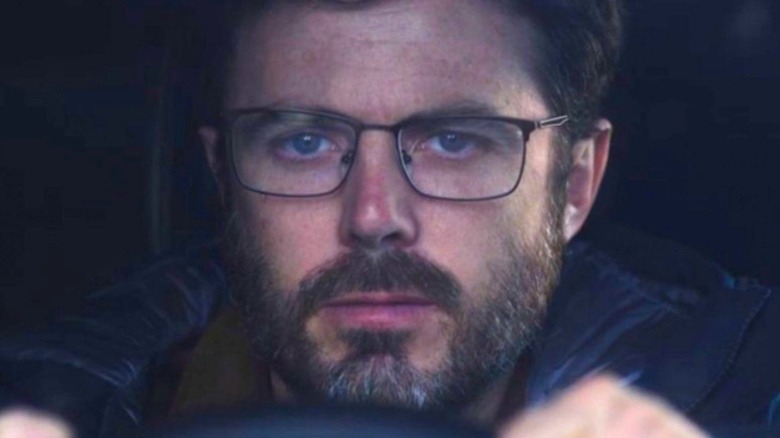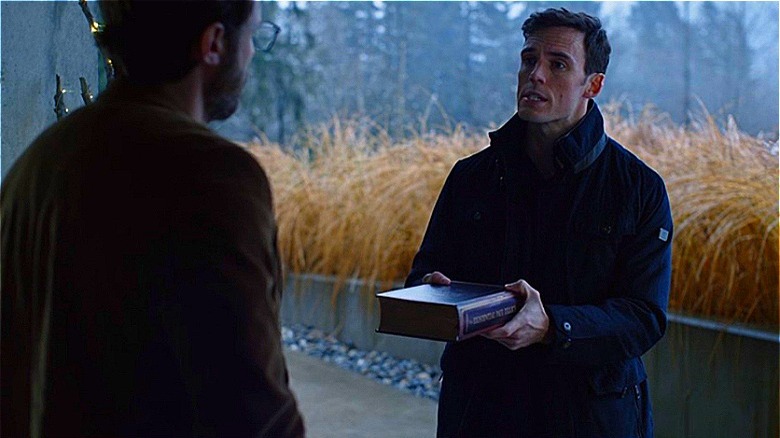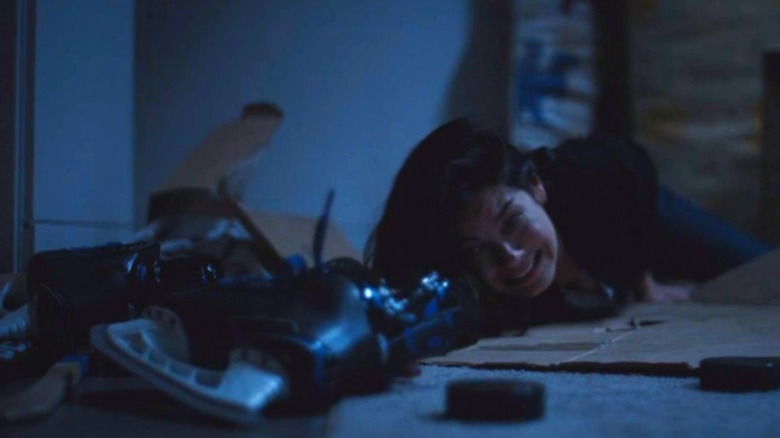The Ending Of Every Breath You Take Explained
"Every Breath You Take" is a 2021 psychological thriller starring Casey Affleck, Michelle Monaghan, and Sam Claflin. The film follows a psychiatrist whose life goes awry after he meets the brother of one of his patients who died. Originally entitled "You Belong to Me," the film took over a decade to be made.
Starting pre-production back in the summer of 2012, Rob Reiner was originally tasked with directing (via The Hollywood Reporter). Harrison Ford and Zac Efron were also eyeing the project to potentially star in (via The Wrap). Things were then put on hold for several years, until it was reported in late 2019 that the cast and title would change, with the film's director now Vaughn Stein, best known for his work in the 2018 thriller "Terminal" starring Margot Robbie (via The Hollywood Reporter).
While "Every Breath You Take" is far from the most acclaimed thriller out there (with a 21% on Rotten Tomatoes), the film nevertheless contains engaging themes that are worth discussing, especially when it comes to its ending. So, just what does this thriller have in store for us? Let's dive in and find out.
Don't judge a book by its cover (or its author)
Psychologist Philip Clark's (Ben Affleck) patient Daphne (Emily Alyn Lind) has lived a life full of abusive relationships. To try and help her, Philip attempts a new kind of therapy where he relays his own personal dilemmas to her to relate more. A few years earlier, Philip and his wife lose their son Evan in a tragic accident. The decision to share this with Daphne garners a good bit of controversy from those around Philip, as many believe it is really him trying to get therapy for himself.
Later on, following the death of her close friend, it's discovered that Daphne has died as well, and the police believe that it's suicide. In turn, those in Philip's life begin to question if his unorthodox therapy techniques are a cause. Philip and his family then meet Daphne's brother, a writer named James Flagg (Sam Claflin). James quickly starts warming up to Philip's family, and Philip even decides to buy one of his books, which will take a few weeks to arrive. James starts getting especially close with Philip's daughter Lucy (India Eisley) and his wife Grace (Michelle Monaghan). He seduces both and gains their trust, all while ruining Philip's life in the process. James entices Grace and Lucy with a vision of a caring and understanding man who isn't connected to any of their existing trauma.
When he finally receives the book, Philip learns that James is the name of a different person, while the person they know is actually a man named Eric Dalton who is Daphne's abusive ex-boyfriend. Not only that, but he's the one who kills Daphne's friend in an attempt to make her lonely and want him. When that doesn't work, Eric kills her. While Philip is unable to save Daphne from Eric, he now must overcome the trauma tearing his family apart to save Lucy and Grace from him.
If you or anyone you know is having suicidal thoughts, please call the National Suicide Prevention Lifeline at 1-800-273-TALK (8255).
Tragedy turns to triumph
Early on, we learn about Philip and Grace's son Evan, who dies in a car accident three years previous while Grace is taking him to hockey practice. This causes a great deal of turmoil within the family. Grace stops talking to Philip while Lucy is expelled from school due to drug problems. Philip, despite being an accomplished psychiatrist who helps people for a living, remains helpless in trying to fix his own family.
After killing Daphne, Eric meets the family and can clearly see their issues, taking advantage of them to manipulate the situation. At the end of the film, the truth about Eric is out and he is going after Lucy, with Philip and Grace racing home to stop him. The couple makes it just as Eric begins his assault on Lucy and Philip proceeds to fight him. They fight for a bit but Eric ultimately gets the upper hand. Just as he prepares to take out Philip, Grace grabs a pair of Evan's hockey skates and uses them to stab Eric multiple times, saving her husband.
The choice to use the skates as the key weapon in this scene is a major bit of symbolism. In this one act, Grace allows herself to let go of the pain that has held her back from fully embracing her family's love. If it wasn't for the hockey game they were driving to that fateful day, her son would maybe still be alive. So the skates themselves represent both the love Grace has for Evan and a painful reminder of the day itself. But in using the skates as a weapon against Eric, Grace is taking her trauma and transforming it, allowing it to save her family, rather than tear it apart, as it was previously doing. Using this remaining memory of her child to save her family releases her of trauma, as she realizes that what matters is to live for those who are still in her life today while honoring Evan's memory.


